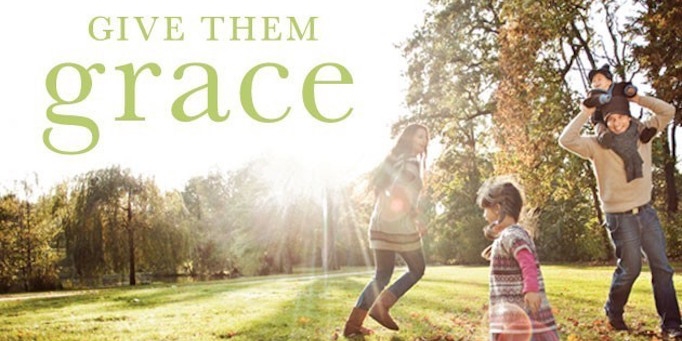
Give Them Grace: Book Review
How do parents teach children about grace and forgiveness while also maintaining discipline?
I recently finished reading Give them Grace - Dazzling your kids with the Love of Jesus, by Elyse Fitzpatrick and her adult daughter Jessica Thompson, and found it very helpful in a number of ways in which it convicted me personally and helped me to change my attitudes.
I have a love-hate relationship with Christian parenting books. I want to figure out the practical how-tos of such an important dimension of life, in a way that understands the world (including the particular slice of the world that is our own culture) and understands the difference that comes from knowing Jesus. So I appreciate the energy that the authors of Christian parenting books put into trying to apply godly wisdom to such an important topic. But I'm also aware (or at least partially aware!) of the ways in which parenting books can feed into my anxiety and perfectionism and self-righteousness.
Beyond 'how to'
Give them Grace isn't your typical 'how-to' Christian parenting book. In fact, it spends some time critiquing the approach of books which offer the explicit or implied promise of perfect children if you follow their method. In place of that approach, it emphasises just one main theme throughout: the need for Christian parents to teach their children about God's grace and to rely upon it themselves. Elyse Fitzpatrick, a grandmother now, humbly admits that she was too moralistic in her own parenting, and encourages us to parent our children in a framework of grace:
The good news of God’s grace is meant to permeate and transform every relationship we have, including our relationship with our children. All the typical ways we construct to get things done and get others to do our bidding are simply obliterated by a gospel message that tells us that we are all both radically sinful and radically loved. At the deepest level of what we do as parents, we should hear the heartbeat of a loving, grace giving Father who freely adopts rebels and transforms them into loving sons and daughters. If this is not the message that your children hear from you, if the message that you send them on a daily basis is about being good so that you won’t be disappointed, then the gospel needs to transform your parenting, too. (p. 21)
A book for kids and parents
In many ways, the main focus of the book is not our children, but our own hearts as parents. The basic idea is that we need to understand God's grace ourselves, then show it to our kids.
Before I read this, I would have said that as Christian I had this covered - and of course, I do understand that I am saved by God's grace. But as I read I was still convicted of areas in my own life where my actions and emotions do not reflect this reality. The book did illuminate many areas of my parenting which are driven less by God's grace than by a kind of anxious moralism. I found it encouraged me to examine my own motives and think about whether my parenting at the moment is geared toward the end of having 'good kids' (who are Pharisaical) - or kids that understand and lean on God's grace (and are learning goodness within that framework).
I found myself repenting of the times when I find myself succumbing to frustration at my kids' sin and imperfection, rather than pointing them to the good news of the gospel. I also found myself repenting of the times I've felt pride about 'good' behaviour from my children, and the times I've felt tempted to view them as fundamentally 'good' (or at least better than everyone else's kids!).
Grace-infused parenting
In the past, I've read books about grace in parenting that frustrated me because they seemed to suggest that it didn't matter how you parented your kids - as long as you talked a lot about God's grace and did a lot of forgiving and asking for forgiveness.
This approach failed to convince me; I think the Bible is clear that it does matter how we are to behave, and that it is a blessing for children when their parents teach them about the shape of reality, scaffold their behaviour with good rules informed by God's wisdom, and enforce those rules lovingly and consistently. I was pleased therefore, that the authors were quick to point out that we are to teach good and wise behaviour, to discipline our children, and to see our discipline of our children as a means of grace in their lives.
It would have been nice if there had been a bit more about the vision of God and the world that teaches us what wisdom looks like and what 'good' means (and a better biblical-theological treatment of God's law). It would also have been good if there were and some practical tips on how to help kids learn the shape of reality and the way to live a life that pleases God. But it wouldn't be fair to criticise the book for not achieving things that it never set out to do.
Final thoughts
If I had one little criticism of how the book set about achieving what it did aim to do, it was in relation to the sections which contained suggested responses (word for word) for various situations you may need to discipline and teach and correct. The idea of these was to give examples of how a parent might respond to these situations from a grace-based framework.
However, I wondered if these suggestions for how to talk about grace were a little forced. I couldn't imagine myself having these sort of conversations with my children every time they sinned and I actually don't think it is necessary to turn every discipline situation into a long conversation. It can be useful, I think, to adopt a few simple, formulaic 'liturgies' for parents and kids to fall back on in some of the typical, recurring scenarios of life. But I don't think every discipline situation needs to become an occasion for a little sermonette on God's grace.
Another question I had was whether it would be as helpful for a parent who was coming from a parenting framework that is very different to mine. Yes, it was a helpful corrective to someone like me, who has a tendency towards legalism, and already has a lot of structure and direction. But, it may not be as helpful to someone who had a different framework and family background.
But personally speaking, I found it has had a very positive impact on my own parenting (and the rest of my life as I've reflected on God's grace again!). I would definitely recommend it.
Nicole Starling blogs at 168hrs.blogspot.com.au
For more articles from Growing Faith, subscribe to our monthly e-newsletter.
To hear about the latest books and resources from Youthworks Media, subscribe here.






